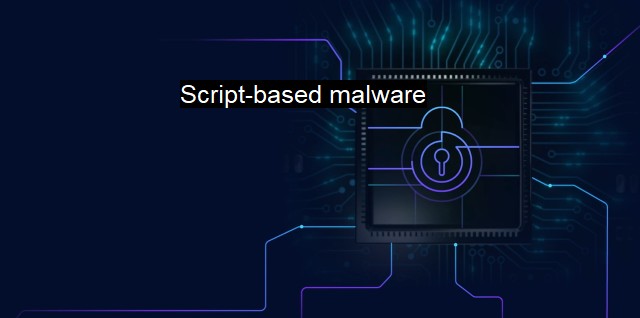What is Script-based malware?
Understanding the Threat of Script-Based Malware: How Attackers Use Scripts to Execute Malicious Commands and Damage Systems
"Script-based malware" is a term that emerges in the discussion of cybersecurity and antivirus protocols. It refers to a harmful software or malicious code written in a scripting language meant to perform unsolicited actions on a computer system. Scripts based malware is one of the major threats faced in the cybersecurity field as they are easy to generate and spread across different systems while bearing potential to cause significant damage.Like traditional malware, script-based malware is designed to compromise a computer system without the user's knowledge. it differs in the delivery method and the manner that it carries out its malicious activities. Traditional malware usually takes the form of executable files, which are readily blocked by most antivirus applications. In contrast, script-based malware is often embedded into websites, files, or applications as seemingly harmless scripts.
Script-based malware utilizes cross-platform scripting languages such as JavaScript, VBScript, or PowerShell. Because scripting languages are often crucial in the smooth operation of legitimate software and websites, they can bypass traditional antivirus defenses effortlessly. This makes script-based malware an insidious threat in today's digital landscape.
Script-based malware can be more versatile compared to traditional executable-based malware due to its adaptability and the ease with which it can be deployed and updated. Scripts are generally more condensed and faster than full executable programs, which makes them harder to detect and easier to deliver without causing suspicious activities on a network. Also, since scripts are interpreted at runtime, instead of being compiled like typical executables, they don't leave traces that are ordinarily used to identify and flag malware.
Several types of script-based malware function in especially stealthy manners. Polymorphic scripts, for instance, can change their form in each iteration, rendering signature-based antivirus apps relatively powerless against them. Similarly, file-less malware, another type of script-based malware, operates directly in memory without creating observable files, thereby making traditional filesystem scanning ineffective.
DRAM-based malware, a subset of file-less malware, resides in the system's memory (RAM) instead, making it invisible to standard disk scans. It starts its malicious activities once the system is booted and disappears once the system is turned off, making it difficult to detect and remove.
JavaScript malware, another common type of script-based malware, can take multiple forms such as cryptocurrency miners, keyloggers, and web shells. Here, by manipulating JavaScript's dynamic nature, attackers can run malicious codes within the browser. This poses a significant threat as it inhibits a direct, dynamic interaction between the code and the user's browser potentially bypassing traditional virus scans.
Script-based malware's ingenuity rests on its ability to mimic typical user behavior, blend in with legitimate code, and exploit the inherent trust that systems put in applications. This effectiveness has made them popular among cybercriminals, serving as an efficient delivery vehicle for larger scale attacks from ransomware to botnets.
To combat script-based malware, cybersecurity experts recommend advanced antivirus software that includes behavior-based detection techniques. These monitor systems for suspicious activity rather than relying on signature-based recognition, which is ineffective against script-based threats. educating users about the dangers of clicking unfamiliar links, the importance of regular system updates, and use of licensed software, aids in maintaining robust network hygiene.
Hence, in the ongoing fight against cybersecurity threats, understanding the insidious nature and operation of script-based malware is crucial. Despite its deceptive simplicity, such malware harnesses intensive potential to inflict damage. Hence, the focus should be on developing more sophisticated detection and prevention tools, coupled with robust network policies and user awareness. As technological advancements persist, the evolution of cybersecurity measures to counter script-based malware also remains pivotal in maintaining a secure digital front.

Script-based malware FAQs
What is script-based malware?
Script-based malware refers to a type of malicious software that uses scripting languages, such as JavaScript or VBScript, to execute its malicious actions.How does script-based malware infect a computer?
Script-based malware generally infects a computer by either exploiting vulnerabilities in software or tricking users into downloading and running the malicious script.What can be the potential impact of script-based malware?
Script-based malware can cause a range of harm, including stealing sensitive information, encrypting files and demanding payment for their release, using the infected computer as a part of a botnet, and compromising the system's security by installing backdoors or other malware.How can I protect my computer from script-based malware?
You can protect your computer from script-based malware by keeping your software up to date and using reputable antivirus or anti-malware software. You should also avoid clicking on suspicious links or downloading unknown files from untrustworthy sources.| | A | | | B | | | C | | | D | | | E | | | F | | | G | | | H | | | I | | | J | | | K | | | L | | | M | |
| | N | | | O | | | P | | | Q | | | R | | | S | | | T | | | U | | | V | | | W | | | X | | | Y | | | Z | |
| | 1 | | | 2 | | | 3 | | | 4 | | | 7 | | | 8 | | |||||||